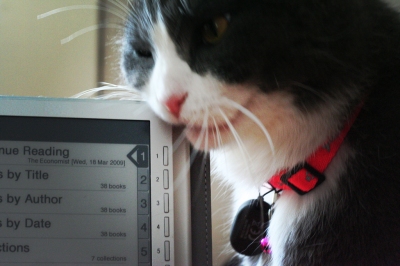May 4, 2010
Three more days
Deprecated!
India, Ink., has moved. The live version of this post is now located at http://ink.indiamos.com/2010/05/04/three-more-days/. Sorry for the inconvenience!
This Thursday at 12:40 p.m., I have to publicly present some sort of something about my vague and fugitive master’s thesis. The talk—about ten minutes’ worth—will be streamed online so you, my friends, can all point and laugh, and the video will be archived somewhere (hopefully somewhere dark and offline) after the event.
Oy vey.
In the meantime, I’m trying to figure out what the hell to say and show, and I’ve had to write a short description of my work for a (printed!!) book of my class’s thesis projects—a book that was, of course, laid out by me, who obviously had nothing better to do with my time. The following is the lofty prose I came up with, sometime between birds-tweeting-time and sunrise this morning:
Read the rest of this entry »
Permalink Comments off
April 4, 2010
The option that wasn’t
Deprecated!
India, Ink., has moved. The live version of this post is now located at http://ink.indiamos.com/2010/04/04/the-option-that-wasnt/. Sorry for the inconvenience!
One of the things I like—a unique feature, as far as I’ve seen—about Kobo’s e-reader software for iPhone OS is that it gives you a choice between vertical scrolling and traditional pagination. Because, really, what do pages mean on a digital reader where the text can reflow according to user preferences? Great. So, I selected vertical scrolling.
Problem is, even if you choose this setting, you will still run into page breaks:
Read the rest of this entry »
April 1, 2010
Hyphenation in Stanza
Deprecated!
India, Ink., has moved. The live version of this post is now located at http://ink.indiamos.com/2010/04/01/hyphenation-in-stanza/. Sorry for the inconvenience!

Okay! I’ve got basically one month left in which to do my thesis project, so I’m thinking I should try to blog about a little something every day, to force myself to process some of this stuff. Perhaps call it BroTheBloPoMo—Brooklyn Thesis Blog Post Month.
Read the rest of this entry »
February 12, 2010
E-book Abomination Index
Deprecated!
India, Ink., has moved. The live version of this post is now located at http://ink.indiamos.com/2010/02/12/e-book-abomination-index/. Sorry for the inconvenience!
I’ve been reading a lot of e-books in the past ten days or so, and I have seen a lot of messy formatting. But the latest one takes the cake: a McGraw-Hill Professional book in which the first letter of every paragraph appears on a line by itself. Thus:
T
he quick brown fox jumps over the lazy dog.
Hella annoying. And there was an egregious typo in the book, repeated three times in one paragraph. Annoying enough that I dug around on the McGraw-Hill site until I found a place to lodge my complaint.
But then I got to thinking, as I filled out their lengthy incident report form, that if I want to report every fucked-up e-book I come across—which is most of them—I could spend the rest of my life chasing around on publishers’ websites for the buried feedback addresses or forms. And then I thought, Why not set up a sort of Hall of Shame where not only I but anyone else who finds a crappy e-book can post the gory details?
Ladies and gentlemen, may I present to you the E-book Abomination Index submission form?
Read the rest of this entry »
February 2, 2010
Room for improvement. No—wait—airplane hangar for improvement.
Deprecated!
India, Ink., has moved. The live version of this post is now located at http://ink.indiamos.com/2010/02/02/room-for-improvement-no—wait—airplane-hangar-for-improvement/. Sorry for the inconvenience!
Below are slides from a presentation Liza Daly gave at the Digital Book World conference last week. There are elaborative notes on the DBW site.
Are you a bookfuturist?
Old news but good news:
I also want Bookfuturism.com to be a kind of social network for Bookfuturists like me. There are clear markets for writing by technological triumphalists (I call these guys and girls technofuturists) and doomsayers (when it comes to reading, this group can be called bookservatives). It’s easy to give a thumbs-up or thumbs-down to new technology; it’s a lot harder to try to engage with its strengths and weaknesses, to think of ways it could work better, to situate it in history, to study its effect on a culture.
Read the rest of this entry »
February 1, 2010
Clarifications

Left: Eirik Newth. Right: Me.
Easy mistake; could happen to anyone, we’re so alike. Except that, y’know, he’s a genius.
Here (with some corrections), in case anybody else interpreted my posts from this weekend in similar ways, is a way-too-long comment I just posted in response to Doyce Testerman’s Publishing, Charlotte*, and John*. You should start there, or it won’t make much sense. The part of Doyce’s post where poor Eirik gets dragged into things and where my grumbling gets taken somewhat out of context is at the very end:
In the postscript to this piece, Eirik Newth explains why Big Publishing consistently cites costs to create ebooks that fall miles outside my experience and expectation.
Short version: they’re doing it wrong.
Long version:
Publishers are still producing paper books the “X-Acto–and–wax” way and then outsourcing their e-book production to other companies, which probably automate the conversion process, and then they’re not practicing any kind of QA on what comes back, because nobody gives a shit, because the people who make the decisions don’t read e-books.
No wonder they think making an ebook is an expensive, time-consuming process.
Yes, you read that right. Publishers aren’t producing workable electronic files when they produce a paper book — their product essentially has to be OCR’d by a third party company to get an ebook out of it. They start with a hardcopy and make someone else turn it into an electronic version, which they’ll never read.
Oops. So I sez to him I sez, No, actually, you didn’t read that right:
Read the rest of this entry »
January 30, 2010
What’s been gnawing at me lately
One of the things that I find gets more difficult year after year—and I can’t tell if this is more because I’m getting older, or because I’m letting myself be pelted with information faster and harder than ever before, or because I don’t write as regularly as I used to—is synthesizing ideas. I spend hours each day gathering information, and some days it seems like for every page I read on the Web, I open or bookmark two more to read later. Yet when an occasion arises for me to state what I think about what I’ve read, I most often end up blurting out whatever my gut tells me, rather than what’s the result of deliberate analysis and consideration—because who has time to ruminate? I’ve heard the rumor, of course, that our guts know more than we think they do, but as I haven’t yet had time to read up on the subject, I can’t say to what extent or in what circumstances that’s true. My gut is whispering to me, however, that my gut is often misguided or misinformed.
For at least the last few months, as I’ve been trying to figure out what I want to do (a) for my master’s thesis and (b) to pay back my student loans after I finish the damn thing, I’ve been trying to absorb as much information as possible about e-books, e-readers, and the future of the book in general. I’ve read articles, essays, and tweets; listened to podcasts, panels, and lectures; watched videos and (sorry to have to use this word:) webinars; and talked with a lot of people. I’ve done a lot of talking at people, too, pushing and no doubt breaking the limits of courtesy with dozens of unfortunate friends, acquaintances, and strangers as I try to articulate what my gut tells me about all this partially digested input. And I’ve written about a few small things, trying to finely chew at least some corners of the subject.
Just in the last week, thanks to the Digital Book World conference and Apple’s iPad announcement, I’ve skimmed, read, watched, heard, or bookmarked thousands of chunks of content—most of them tweets, since I wasn’t present at either event but followed along through hashtags and Twitter lists—having to do with books in the digital era.
And what do I think about all of it?
I don’t know.
Read the rest of this entry »
December 8, 2009
“books do certain things well and digital technologies do other things well”
There’s a fab article hidden behind the Chronicle of Higher Education paywall:
Some years ago, Terry Belanger found a striking way to reveal the reverence that many citizens of the digital age continue to feel for old books. It is a sentiment he finds fascinating but only rarely appropriate or useful. Belanger, who retired in September as director of an educational institute called Rare Book School but who continues to teach there, brings an old volume to class, speaks about its binding and typography, and then, still discussing the book, rips it in half and tears it into pieces. As his horrified students watch in disbelief, Belanger tosses the shards into a nearby trash can and murmurs, “Bibliography isn’t for sissies.”
—The Book Mechanic: A modern sensibility binds Terry Belanger to old, rare volumes, by Andrew Witmer (Chronicle Review 41, December 6, 2009).
(Via Guy, who got it from @roncharles)
Read the rest of this entry »
Permalink Comments off












